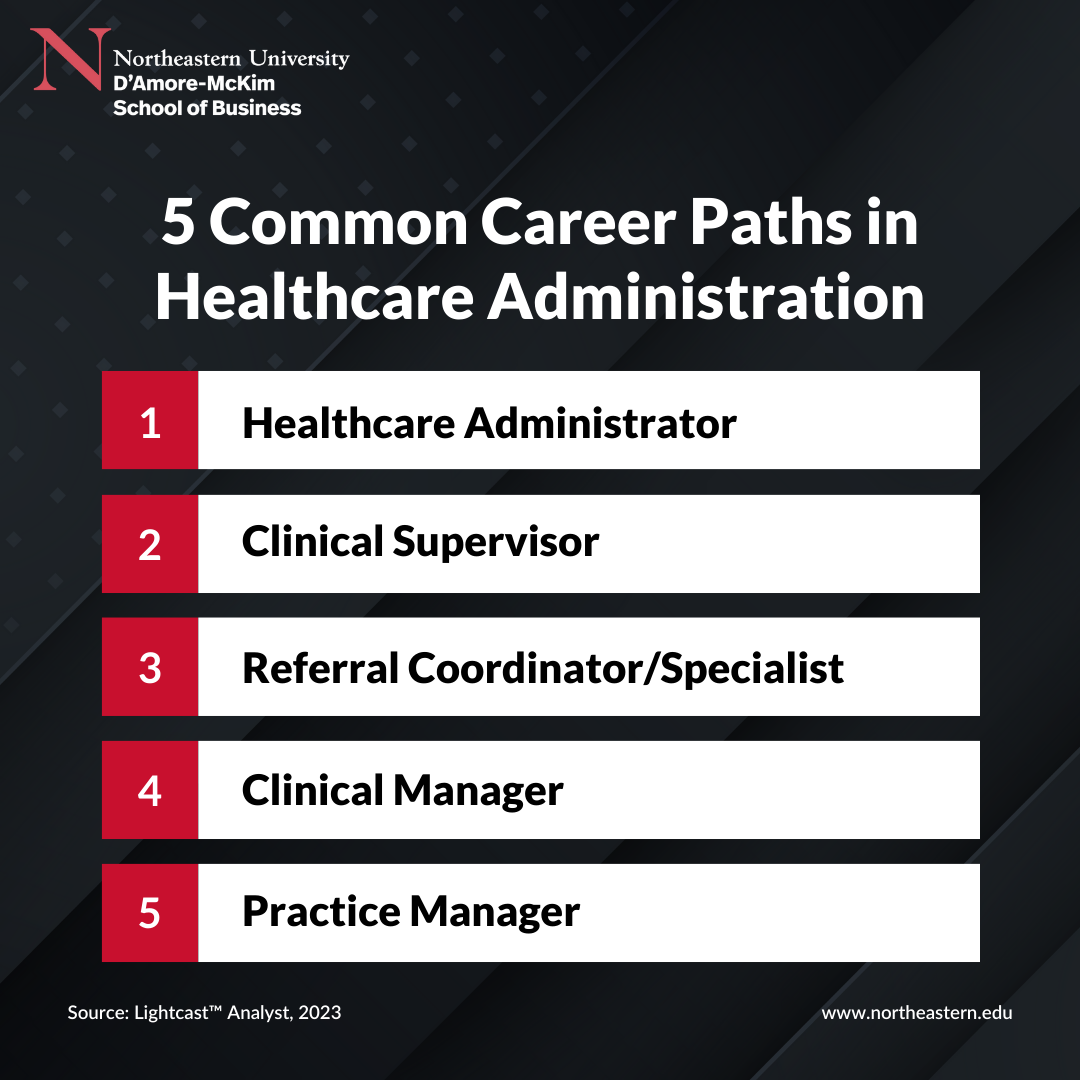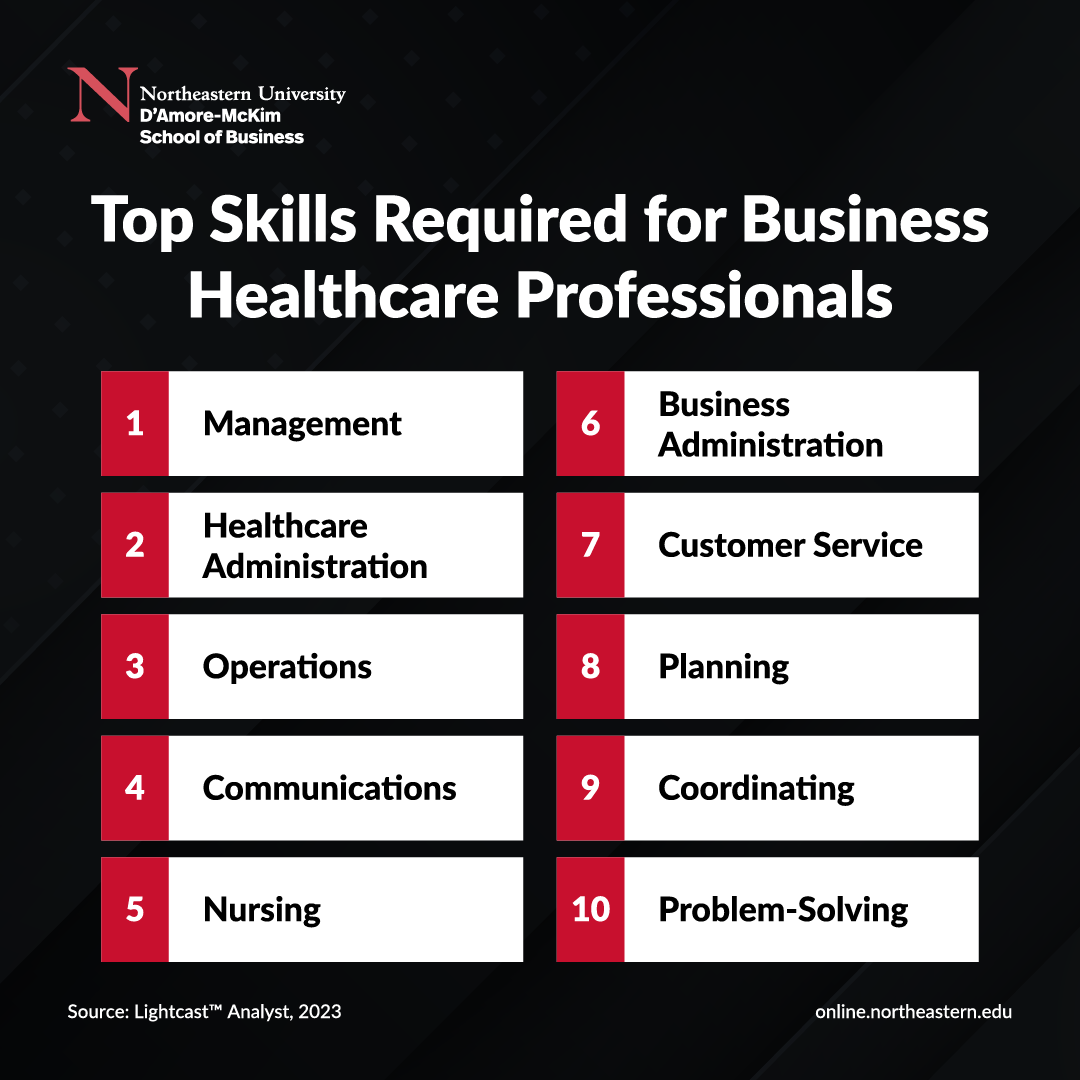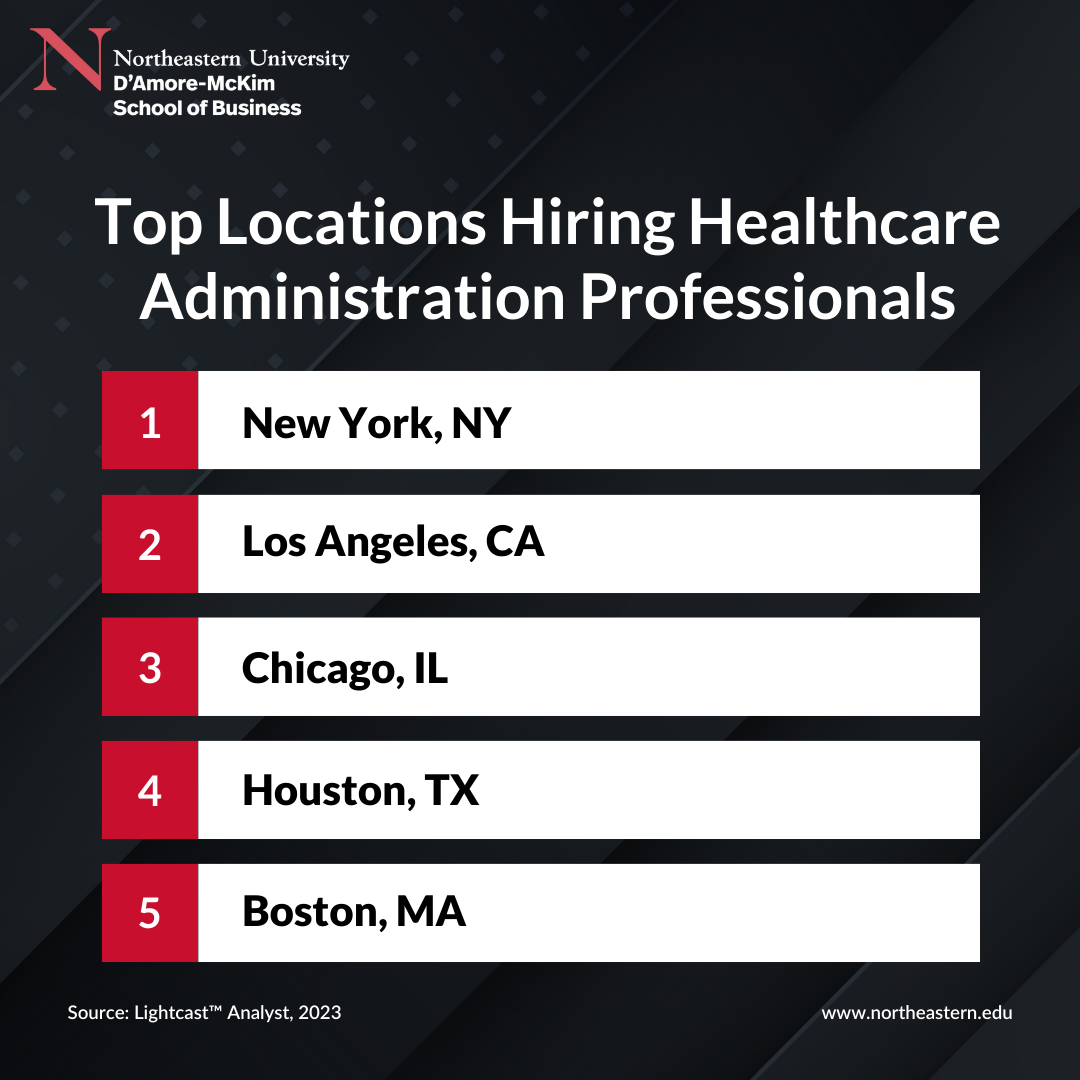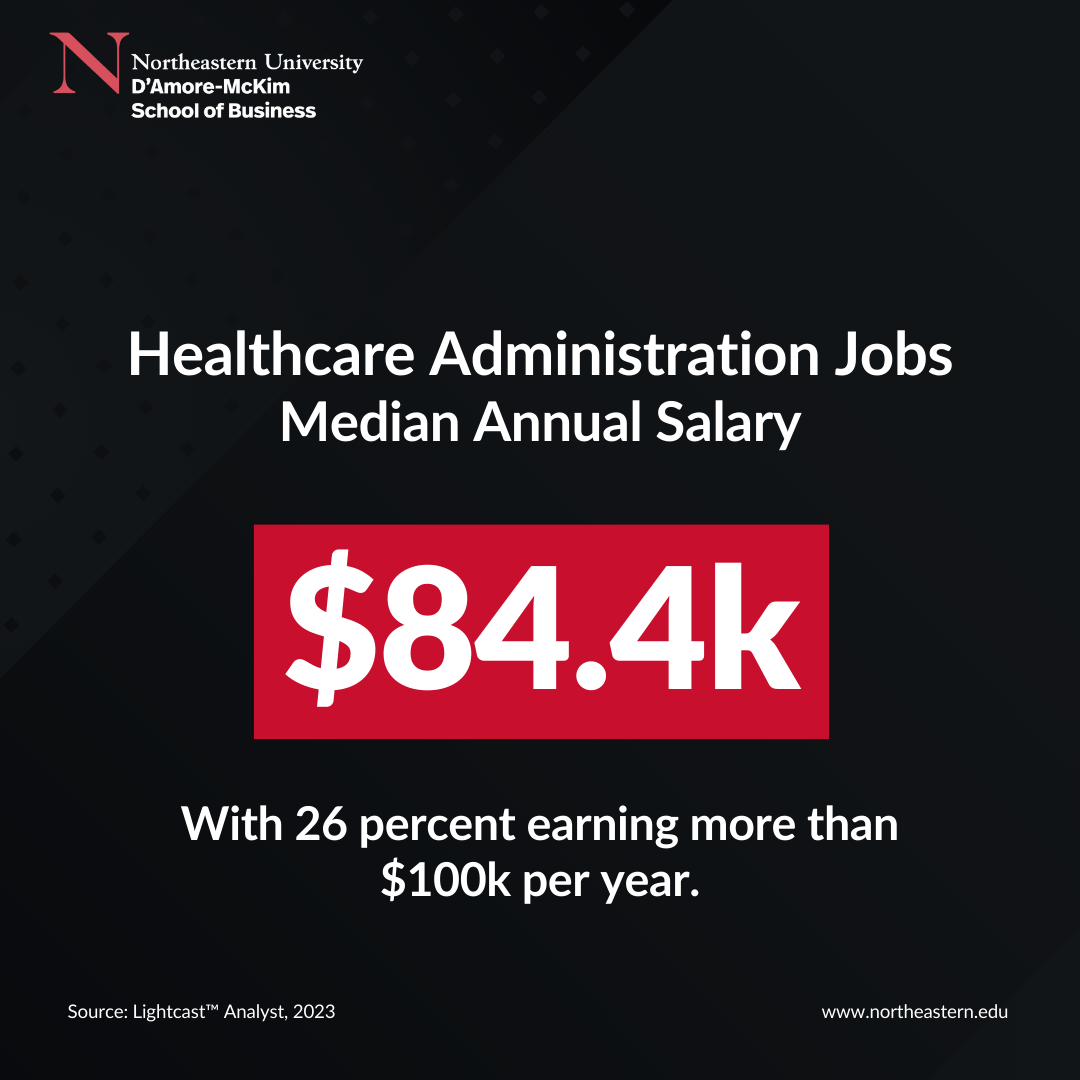Every well-functioning healthcare system has teams of skilled managers who shape operational policies and keep things running smoothly. Healthcare administration careers are largely involved with this process, handling many of these behind-the-scenes tasks that play a crucial role in improving healthcare access and patient outcomes.
“There’s a need for an awareness of disparities in health,” says George Moran, an executive adjunct professor at Northeastern University’s School of Business and College of Health Sciences. Health administrators are vital to creating more equitable and healthier communities, which is largely why there are so many career opportunities in this field.
If you’re passionate about serving your community, here’s an overview of healthcare administration and the some possible career paths available to you.
Ready to apply? Request an application fee waiver
What Is Healthcare Administration?
Healthcare administration is the coordination and supervision of all activities within the healthcare system. This means administrators provide the support and resources healthcare professionals need to effectively treat patients.
Healthcare administrators are often tasked with the following responsibilities:
- Recruiting, training, and scheduling new staff
- Monitoring inventory and budgets
- Managing billing
- Overseeing facility compliance
While healthcare administration is closely related to healthcare management, health administrator roles focus on putting business strategy into action. This means they are closely tied to the daily operations of any facility providing healthcare services.
5 Healthcare Administration Careers
Learning the ins and outs of how a medical facility operates is essential to becoming a leader in healthcare. Therefore, entering the business side of healthcare through an administration career can provide the foundation you need to gain confidence in the field.
According to our analysis of job posting data, the most common career paths in healthcare administration for both career changers and those already working in healthcare include:
1. Healthcare Administrator: Regularly interacts with doctors, nurses, surgeons, and technicians to direct the operations of healthcare facilities.
2. Clinical Supervisor: Guides and mentors clinical staff, ensures adherence to protocols, and maintains high-quality patient care standards.
3. Referral Coordinator/Specialist: Oversees the process of referring patients to specialists or other healthcare providers, ensuring timely access to care.
4. Clinical Manager: Supervises daily operations in clinical settings, including staffing, budgeting, and quality assurance.
5. Practice Manager: Works for medical practices, managing administrative staff, finances, and other operational matters.

While this list shows some common job titles, healthcare administration is a diverse field. This means, depending on your professional experience, there are additional roles that provide exciting career opportunities in healthcare administration.
According to Moran, some additional career paths for professionals interested in healthcare administration include healthcare data analysts, data engineers, operations analysts, and statisticians. These positions work to develop systems for managing and evaluating healthcare data. In the finance sector, healthcare professionals can work as billing specialists, accountants, accounts payable administrators, and medical records specialists.
Beyond these job titles, the various locations healthcare administration roles work in is another important factor to consider before choosing which career is right for you.
Where Do Healthcare Administrators Work?
Healthcare administrators work in a variety of settings that either provide direct care or handle data and products related to wellness.
Some common employers of healthcare administrators include:
- Hospitals
- Nursing homes
- Clinics
- Imaging centers
- Medical technology companies
However, the delivery of health services has evolved as providers streamline their operations and try to reach underserved communities.
“Think about CVS,” Moran says. “They now compete with physician practices with their Minute Clinics. How do local physicians compete with that? How do they innovate? How can they do things differently?”
Another factor to consider is the increase in online health services, which requires healthcare administrators to re-envision the best ways to serve patients, protect privacy, and manage workforces.
Another example of this is Walmart’s entry into the health services market. With new medical offices, Walmart will become another employer of healthcare administration positions.
“Everything is growing at such a rapid pace, and everybody is trying to get into the healthcare space,” Moran says. “So it’s important to understand that healthcare isn’t just traditional hospitals and insurance companies. That’s why I think home-based technology healthcare and analytics are two areas that I would recommend that people really explore.”
Top Industries
Since healthcare is a growing field, it isn’t surprising that there are a number of industries that hire healthcare administration professionals.
According to our analysis of job postings data, here are the top industries hiring healthcare administrators:
1. General Medical and Surgical Hospitals: Hospitals are large-scale operations that depend on departmental and specialist mangers to coordinate clinical and non-clinical teams and oversee all functions contributing to patient outcomes.
2. Direct Health and Medical Insurance Carriers: Direct providers are smaller urgent care or preventive care services, which need administrators to manage staffing, compliance, and finances. On the other hand, medical insurers communicate with medical facilities, comply with health laws, and develop coverage policies.
3. Offices of Physicians: Private or group practices typically have a manager supervising the entire facility, providing strategic guidance for the business.
4. Employment Placement Agencies: Administrators for healthcare staffing firms have to develop effective strategies for finding qualified talent and meeting the demands of healthcare facilities that are facing shortages.
5. Colleges, Universities, and Professional Schools: Academic institutions hire healthcare administrators to manage campus health services and serve as instructors for healthcare degree programs.
6. Home Health Care Services: When deploying services to private homes, healthcare administrators are essential for overseeing staff, provider relationships, health regulations, and patient success.
7. Pharmaceutical Preparation Manufacturing: Administrators in pharmaceutical settings must coordinate operations and develop strategic plans based on the public health issues and government regulations shaping their industry.
8. Nursing Care Facilities: Nursing care administrators are responsible for training and staffing health providers, and they must stay up to date on trends, challenges, and best practices in geriatric care.
9. Ambulatory Health Care Services: Managers in these sectors must be skilled at coordinating and deploying services to reach vulnerable populations and improve public health outcomes. According to Moran, the ambulatory services industry provides a unique opportunity to stitch together and better understand the healthcare ecosystem.
10. Assisted Living Facilities for the Elderly: Similar to nursing care, managers in assisted living facilities must monitor the health concerns of residents and acquire the right staff, training, equipment, and resources to provide ongoing support for their changing needs.

Top Locations
While careers in healthcare administration are in demand nationally and globally, some hotspots offer a highly active and diversified environment to explore a variety of jobs.
According to our analysis of job postings data, the top cities hiring healthcare administration professionals include:
1. New York, NY
2. Los Angeles, CA
3. Chicago, IL
4. Houston, TX
5. Boston, MA

Boston, in particular, is a hub for medical and healthcare innovation, according to Moran. The area is home to some of the country’s leading medical research, pharmaceutical, and healthcare organizations.
Why Work in Healthcare Administration?
Few fields offer as much flexibility to chart your own path as healthcare administration. In the healthcare field, there’s a lot of potential to explore different industries and settings, so you can learn to think strategically and decide how to specialize in your career. Healthcare administration also attracts “mission-driven” people, says Moran, so these roles are often a good fit for those passionate about helping others.
Another benefit of healthcare administration is earning potential. According to our analysis of job postings data, healthcare administration job titles have a median advertised salary of $84,400, with 26 percent of those professionals earning higher than $100,000 annually. In addition, healthcare administrators have experienced a 62 percent wage growth between 2020 and 2023—making this career path a financially stable one.

With healthcare being a staple industry, you can expect long-term job security as well. For example, medical and health services managers have an exceptionally low unemployment rate. U.S. News also rated this occupation #1 in Best Business Jobs, #3 in 100 Best Jobs, and #3 in Best STEM Jobs.
Overall, healthcare administration can offer a well-rounded combination of job satisfaction, strong career prospects, and stable income.
Start a Career in Healthcare Administration
Earning a health administration degree is one of the most beneficial ways to build the foundational leadership skills required. If you’re serious about pursuing this occupation, it’s crucial to broaden your knowledge of healthcare policy, finance, strategic planning, and operations management.
Northeastern University’s MS in Management: Healthcare Administration can help you make progress toward this fulfilling career. The program is designed to prepare graduates to coordinate teams, develop talent, communicate with industry stakeholders, and manage quality in healthcare facilities. Depending on your goals, this advanced degree can equip you for roles in hospitals, insurance companies, nursing facilities, clinics, and more.
To learn more about the program and how it aligns with your interests, contact an admissions counselor for guidance.





